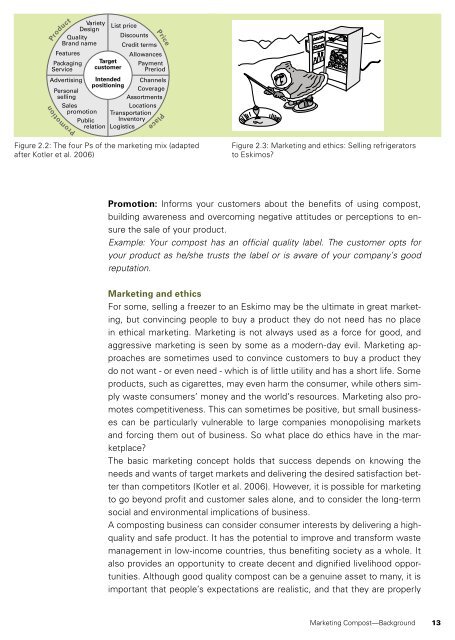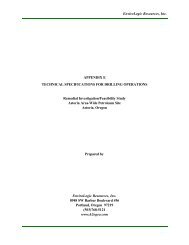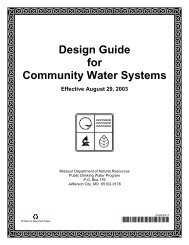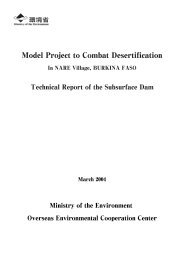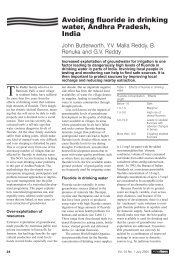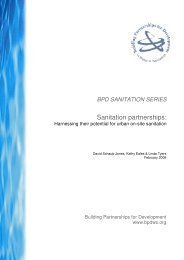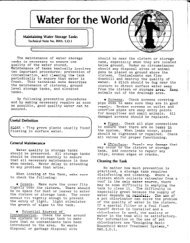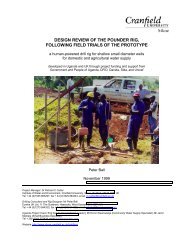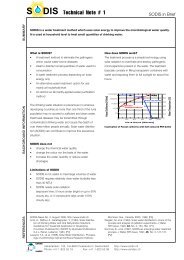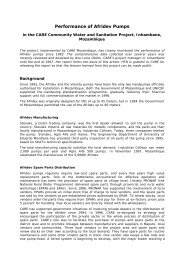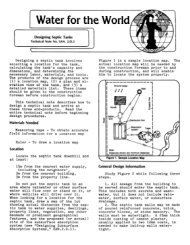Marketing Compost (EAWAG) - The Water, Sanitation and Hygiene
Marketing Compost (EAWAG) - The Water, Sanitation and Hygiene
Marketing Compost (EAWAG) - The Water, Sanitation and Hygiene
Create successful ePaper yourself
Turn your PDF publications into a flip-book with our unique Google optimized e-Paper software.
Variety<br />
Design<br />
List price<br />
Quality<br />
Discounts<br />
Br<strong>and</strong> name Credit terms<br />
Features<br />
Allowances<br />
Target<br />
customer<br />
Product<br />
Packaging<br />
Service<br />
Advertising<br />
Personal<br />
selling<br />
Promotion<br />
Sales<br />
promotion<br />
Intended<br />
positioning<br />
Public<br />
relation<br />
Place<br />
Price<br />
Payment<br />
Preriod<br />
Channels<br />
Coverage<br />
Assortments<br />
Locations<br />
Transportation<br />
Inventory<br />
Logistics<br />
Figure 2.2: <strong>The</strong> four Ps of the marketing mix (adapted<br />
after Kotler et al. 2006)<br />
Figure 2.3: <strong>Marketing</strong> <strong>and</strong> ethics: Selling refrigerators<br />
to Eskimos<br />
Promotion: Informs your customers about the benefits of using compost,<br />
building awareness <strong>and</strong> overcoming negative attitudes or perceptions to ensure<br />
the sale of your product.<br />
Example: Your compost has an official quality label. <strong>The</strong> customer opts for<br />
your product as he/she trusts the label or is aware of your company’s good<br />
reputation.<br />
<strong>Marketing</strong> <strong>and</strong> ethics<br />
For some, selling a freezer to an Eskimo may be the ultimate in great marketing,<br />
but convincing people to buy a product they do not need has no place<br />
in ethical marketing. <strong>Marketing</strong> is not always used as a force for good, <strong>and</strong><br />
aggressive marketing is seen by some as a modern-day evil. <strong>Marketing</strong> approaches<br />
are sometimes used to convince customers to buy a product they<br />
do not want - or even need - which is of little utility <strong>and</strong> has a short life. Some<br />
products, such as cigarettes, may even harm the consumer, while others simply<br />
waste consumers’ money <strong>and</strong> the world’s resources. <strong>Marketing</strong> also promotes<br />
competitiveness. This can sometimes be positive, but small businesses<br />
can be particularly vulnerable to large companies monopolising markets<br />
<strong>and</strong> forcing them out of business. So what place do ethics have in the marketplace<br />
<strong>The</strong> basic marketing concept holds that success depends on knowing the<br />
needs <strong>and</strong> wants of target markets <strong>and</strong> delivering the desired satisfaction better<br />
than competitors (Kotler et al. 2006). However, it is possible for marketing<br />
to go beyond profit <strong>and</strong> customer sales alone, <strong>and</strong> to consider the long-term<br />
social <strong>and</strong> environmental implications of business.<br />
A composting business can consider consumer interests by delivering a highquality<br />
<strong>and</strong> safe product. It has the potential to improve <strong>and</strong> transform waste<br />
management in low-income countries, thus benefiting society as a whole. It<br />
also provides an opportunity to create decent <strong>and</strong> dignified livelihood opportunities.<br />
Although good quality compost can be a genuine asset to many, it is<br />
important that people’s expectations are realistic, <strong>and</strong> that they are properly<br />
<strong>Marketing</strong> <strong>Compost</strong>—Background 13


